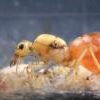Attrition of users and ant journals on sites like this demonstrate that the vast majority of colonies kept by inexperienced hobbyists likely die off very quickly.
The over-representation of minors under 18 in the hobby probably has a lot to do with this.
Nevertheless, while the numerical figure was just a rough estimate, I would wager it is well over 90%.
Using that as an argument for "you can't leave your ants alone" is major grade nonsense. In fact it's so utterly flawed that it's hard to decide from which angle to tear it apart because there's literally NOTHING right with it.
1) There are some random deaths you cannot do anything about, they happen even to experienced antkeepers (the vast majority of these "undeterminatble deaths" happen before the queen even makes it to her first workers). However those random deaths are far below 50% - if even half of all ant queens were duds the ant species in question would have a serious survival problem.
2) Being young doesn't mean you can't properly keep ants. Even a 10 year old can keep ants if he read up the important stuff before and doesn't panic when unforseen stuff happens. In the same way even 30 year olds can fail at antkeeping due to stupidity or lack of research.
3) If 90% of the ants someone keeps die then there's something seriously wrong with the way this person cares for their ants and checking more regularly would change absolutely NOTHING about that (if anything at all it would make it better because the queens don't get disturbed all the time, so maybe they might stop eating their eggs or doing similar bad stuff they do when permanently poked).
I know people who forgot their ant colonies for MONTHS and they didn't die. Some of them grew enormously (this is especially true for Messor ants which can even extract the water they require from the seeds they eat), some survived by eating mold from the cotton and grew in numbers but produced way smaller workers than usual, some just didn't grow in numbers and stayed mostly the same - as long as there was water available barely any colony died (and the Messor colonies didn't even need that, just seeds).
The BY FAR biggest issue with new antkeepers is lack of patience. People check their queens and colonies way too often and risk their survival with stupid actions like shaking them into a new tube because there's a tiny black spot on the cotton.
It is pretty much common ground that colonies should be mostly left alone and not be disturbed too often, especially when they're still in their founding stage - and now you come along and tell everyone that it is absolutely vital for new antkeepers to check on their ants every few days.
That's not just flat-out false, it is HARMFUL.






















